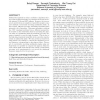Free Online Productivity Tools
i2Speak
i2Symbol
i2OCR
iTex2Img
iWeb2Print
iWeb2Shot
i2Type
iPdf2Split
iPdf2Merge
i2Bopomofo
i2Arabic
i2Style
i2Image
i2PDF
iLatex2Rtf
Sci2ools
NOSSDAV
2005
Springer
2005
Springer
Meeting CPU constraints by delaying playout of multimedia tasks
Multimedia applications today constitute a significant fraction of the workload running on portable devices such as mobile phones, PDAs and MP3 players. However, the processors in such devices are usually not powerful enough to support multiple concurrently executing multimedia tasks. In this context, different processor scheduling algorithms have attracted a lot of attention. This paper attempts to address the CPU constraint problem from a different perspective. It is based on the observation that by increasing the playout delay of a multimedia task, the minimum processor frequency required to run the task decreases. This is due to the high data-dependent variability in the execution requirements of multimedia tasks. We also present a framework, using which it is possible to compute the minimum processor frequency corresponding to any playout delay. Given a set of concurrently executing multimedia tasks, using our framework it is possible to compute the playout delays for each of ...
Related Content
| Added | 28 Jun 2010 |
| Updated | 28 Jun 2010 |
| Type | Conference |
| Year | 2005 |
| Where | NOSSDAV |
| Authors | Balaji Raman, Samarjit Chakraborty, Wei Tsang Ooi |
Comments (0)

